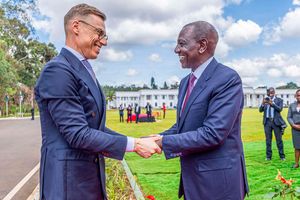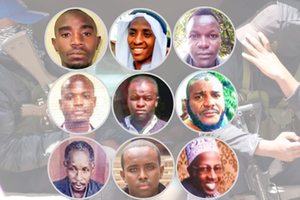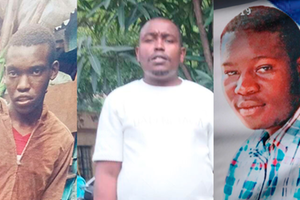
President William Ruto, Inset: Emmanuel Mukuria and Peter Macharia.
Alice Wambui is still holding onto the hope that she will see her son, Peter Macharia, again. It has been almost a year since she last saw him — June 24, to be exact. Since then, her life has become an agonising routine of searching, waiting and asking questions that go unanswered.
“I haven’t seen my son yet,” Ms Wambui told Nation. “When were they released?”
In the time since Peter, 27, disappeared, Alice has scoured hospitals and police stations, chasing every lead, every rumour. Each effort ends the same way: a dead end. The exhaustion has seeped into every part of her life. She’s lost jobs, moved houses and unable to pay rent because her days are consumed by the search. The worst part, she says, is not knowing when the search will end.
For families like hers, Monday’s remarks by President William Ruto came as a jarring contradiction to their reality.
Speaking at State House during a joint press briefing with Finnish President Alexander Stubb, President Ruto declared: "All the people who disappeared or who were abducted, all of them have been brought back to their families and to their homes. I have given clarity and firm instructions that nothing of that nature will happen again. It was my commitment when I became president that extrajudicial disappearances of Kenyans will not be part of what we are doing as a nation.”
For Monica Mwende, that statement was like a wound being reopened.
Her brother, Kalani Muema, is still missing. He is one of four men abducted in Mlolongo in December last year. His phone remains off. His trail, cold. And for Monica, every new day is another cycle of desperate searching.
“I’ve been visiting the City Mortuary (now Nairobi Funeral Home) frequently and hospitals looking for my brother, hoping that perhaps he is among the unknown persons in these facilities,” she said.
“If he is in your custody, dead or alive, please release him,” she pleaded. “He was our family’s breadwinner.”
Her mother, once strong and full of life, has been spiralling.
“She hadn’t been eating,” Monica said. “When she heard that President Ruto said all who had been abducted had been released, she called me to ask whether my brother had also been released.”
But Monica had no news to give. “I told her to give it time, that perhaps he could be released later in the day,” she said softly.
In January this year, the discovery of two bodies—Justus Mutumwa Musyimi and Martin Mwau—at the Nairobi Funeral Home offered a grim twist to this ongoing crisis.
For some families, the discovery of the bodies bring tragic closure. For others, it deepens their agony. Each body identified is another reminder that many remain unaccounted for.
President Ruto's assurance that no state-sanctioned enforced disappearances have occurred has been met with scepticism from civil society and human rights watchdogs.
Vocal Africa, a civil society group that has been working with families of the missing people, directly challenged the President’s claim.
Emmanuel Mukuria, Dennis Chege, and Peter Macharia—who disappeared on June 25, 2024—remain unaccounted for, said Vocal Africa. Martin Mbisi and Kalani Muema, the organisation said, were abducted on December 17 in Mlolongo and are also still missing.
“These names are not isolated cases,” Vocal Africa’s Hussein Khalid said, adding they represent just a fraction of a broader pattern of repression and impunity that has yet to be adequately acknowledged or addressed by the state.
“Contrary to the President's claim, several individuals remain unaccounted for.”
Vocal Africa says it has documented dozens of cases through direct testimonies, field investigations, and partnerships with local networks. The group says many families continue to live in fear, caught in a cycle of pain, silence, and official denial.
That sense of denial is what troubles advocates the most. According to a recent report by Missing Voices, a coalition of human rights organisations, Kenya recorded 55 enforced disappearance cases in 2024—a fivefold increase from 2023’s 10 cases.
Even the Kenya National Commission on Human Rights (KNCHR), a state agency, has raised the alarm. In December, it reported 82 abduction cases since June 2024.
For now, families like Alice’s and Monica’s are left to live between hope and grief, clinging to the idea that maybe—just maybe—their relatives will walk back through the door. But until then, their question remains unanswered: Where are our relatives?









